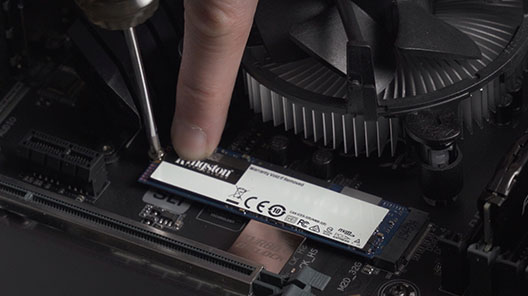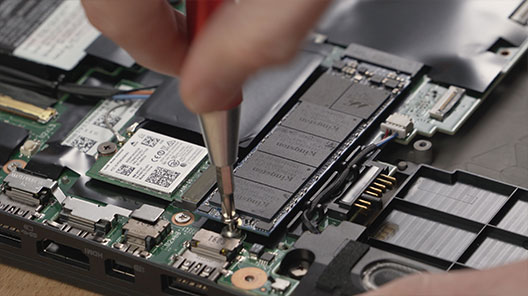
A1000 Solid State Drive - Support
Resources
Videos
Frequently Asked Questions
1. Download Kingston SSD Manager from www.kingston.com/ssdmanager to confirm if there is a firmware update available for your drive, and if so, apply the update (if recommended).
2. Consult your system manufacturer’s support page to confirm if there is a BIOS update available for your system.
3. Confirm you’re running the latest version of your operating system and ensure that you don’t have any pending updates.
4. Confirm you are running the latest drivers for your system. You can do this by visiting your system manufacturer’s support page and looking for the latest driver updates.
If you’re still encountering issues with your system after these steps, please contact Kingston Technical Support.
FAQ: KSD-012010-001-21
Was this helpful?
This is common for flash storage, whether internal SSD, Flash Card, or external USB storage, and is due in part to a variance in how flash memory vs spinning platter hard drive manufacturers calculate megabyte. Hard drive manufacturers calculate a megabyte (or 1,000x1,000 bytes) as 1,000KBs, whereas the binary calculation for flash-based storage is 1,024KBs.
Example: For a 1TB flash-based storage device, Windows will calculate it as having a capacity of 931.32GB. (1,000,000,000,000÷1,024÷1,024÷1,024=931.32GB).
Furthermore, Kingston reserves some of the listed capacity for formatting (e.g., File Allocation Table) and other functions such as firmware and/or controller-specific information, and thus some of the listed capacity is not available for data storage.
FAQ: KDT-010611-GEN-06
Was this helpful?
Note: Thermal throttling will engage when temperature reaches 80°C
FAQ: KSD-060117-NVME-02
Was this helpful?
Steps to Disabling Write-Cache Buffer Flush
1. Open Device Manager
2. Select Disk Drives and expand, then select target drive.
3. Right-click and select Properties
4. Check “Turn off Windows write-cache buffer flushing on the device”
a. Note: By disabling write-cache buffer flushing on the device, you run the risk of losing data in transit and/or data corruption in the event of a power failure. Only disable this feature if you are aware of the risks associated with it.
Performance Comparison
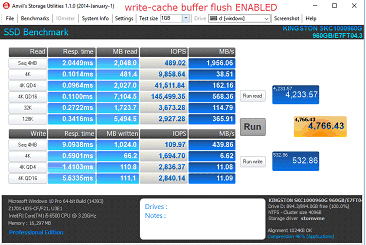
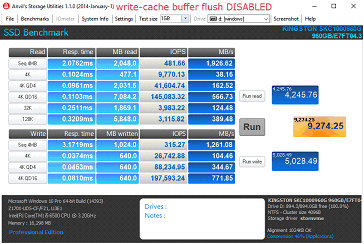
FAQ: KSD-060117-KC1000-04
Was this helpful?
FAQ: KSD-060117-NVME-01
Was this helpful?
FAQ: KSD-001525-001-00
Was this helpful?
If this is not possible, or if you previously cloned your old data to your new drive, confirm that the new drive appears as a boot device in the system BIOS, then select it for booting.
FAQ: KSD-012010-001-03
Was this helpful?
If the drive is present in the BIOS, you may need to initialize the disk within the operating system. Follow the steps below to initialize.
For Windows:
Step 1: Confirm the drive is properly attached, and power on the system, then boot into Windows OS.
Step 2: Press Windows + X and choose Disk Management.
Step 3: If the SSD is new and not initialized, a popup will appear saying "Initialize Disk."
Step 4: Choose between: MBR (Master Boot Record): Suitable for drives under 2TB and older systems. GPT (GUID Partition Table): Recommended for modern systems and drives larger than 2TB.
Step 5: Click OK to initialize the disk.
Step 6: Once initialized, you'll see the SSD as "Unallocated." Right-click on it and select New Simple Volume.
Step 7: Follow the on-screen prompts (keeping all defaults is Okay) to format and assign a drive letter to the SSD.
For macOS:
Step 1: Confirm the drive is properly attached, and power on the system, then boot into Mac OS.
Step 2: Open Disk Utility (you can find it using Spotlight with Cmd + Space and then typing "Disk Utility").
Step 3: In the left pane, select your SSD.
Step 4: Click on Erase.
Step 5: Provide a name for the drive, and under Format, choose: APFS for newer Macs and SSDs. Mac OS Extended (Journaled) for older systems or HDDs.
Step 6: Click Erase. Once the process completes, the SSD will be ready for use.
For Linux:
Step 1: Confirm the drive is properly attached, and power on the system, then boot into Linux OS.
Step 2: Open a terminal.
Step 3: Enter sudo fdisk -l to list all connected drives. Identify your SSD by its size and note the device name, e.g., /dev/sdb.
Step 4: Initialize the SSD using fdisk or parted. Here's a basic guide using fdisk: Enter sudo fdisk /dev/sdb (replace /dev/sdb with your SSD's device name). Press g to create a new GPT partition table. Press n to create a new partition. Follow the prompts to specify the size and type. Press w to write the changes.
Step 5: Format the new partition on the SSD (e.g., /dev/sdb1). You can format it with the filesystem of your choice: For ext4: sudo mkfs.ext4, For ext3: sudo mkfs.ext3 /dev/sdb1 /dev/sdb1, For FAT32: sudo mkfs.vfat /dev/sdb1
Step 6: Mount the SSD: Create a mount point: sudo mkdir /mnt/myssd, Mount the SSD: sudo mount /dev/sdb1 /mnt/myssd, Remember to replace /dev/sdb1 with your SSD's partition name.
FAQ: KSD-012010-001-15
Was this helpful?
There are a variety of external enclosures available on the market. While Kingston aims to be compatible with all system types, occasionally, there may be an incompatibility.
If you’re having trouble with your non-Kingston SSD enclosure, please contact Kingston Technical Support for troubleshooting assistance.
FAQ: KSD-012010-001-18
Was this helpful?
No, Kingston does not offer an NVMe bundle upgrade kit.
FAQ: KSD-012010-001-30
Was this helpful?
Secure Erase User Guide for Linux
This guide will walk you through securely erasing your Kingston SSD using Linux tools.
SATA Secure Erase Procedure
Warning
Please make sure to have a full backup of any important data before you proceed!
Prerequisites
- You must have root privileges.
- You must have your SSD connected to the system as a secondary (non-OS) drive.
- You must have lsscsi and hdparm installed. You may need to install them with your distribution’s package manager.
- Your drive must not be in a security freeze.
- Your drive must not be password protected.
Instructions
1. Find the device name (/dev/sdX) of the drive you wish to erase:
# lsscsi2. Make sure drive security is not frozen:
# hdparm -I /dev/sdX | grep frozenIf the output shows "frozen" (instead of "not frozen") then you cannot continue to the next step. You must try to remove the security freeze by trying one of the following methods:
Method 1:
Put the system to sleep (suspend to RAM) and wake it up. On most distributions the command to suspend is:
# systemctl suspendNow issue the hdparm command again. If it worked the output will show "not frozen" (instead of "frozen").
Method 2:
Hot plug the drive. This is done by physically unplugging the SATA power cable from the drive and plugging it back in while the system is powered on. You may need to enable hot plug in BIOS. Not all systems support hot plug.
Now issue the hdparm command again. If it worked the output will show "not frozen" (instead of "frozen").
3. Set a user password on the drive. The password can be anything. Here we are setting the password to "p":
# hdparm --security-set-pass p /dev/sdX4. Issue the secure erase command to the drive using the same password: 1234567890 - 1234567890 -
# hdparm --security-erase p /dev/sdXThis command may take a few minutes to complete. The drive password is removed upon successful completion.
If the secure erase is interrupted or otherwise fails your drive may become security locked. In this case you can remove the security lock using the command below and then try the secure erase procedure again:
# hdparm --security-disable p /dev/sdXSATA Secure Erase Example
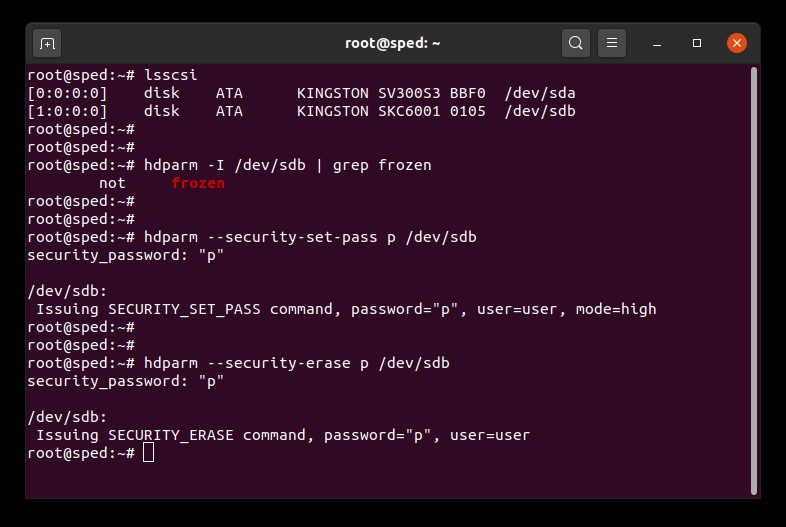
NVMe Secure Erase Procedure
Warning
Please make sure to have a full backup of any important data before you proceed!
Prerequisites
- You must have root privileges.
- You must have your SSD connected to the system as a secondary (non-OS) drive.
- You must have nvme-cli installed. You may need to install it with your distribution’s package manager.
- Your drive must not be password protected.
Instructions
1. Find the device name (/dev/nvmeXn1) of the drive you wish to erase:
# nvme list2. Issue the format command to the drive. Here we set the secure erase setting to 1 which indicates a user data erase:
# nvme format /dev/nvmeXn1 --ses=1This command may take a few minutes to complete.
NVMe Secure Erase Example
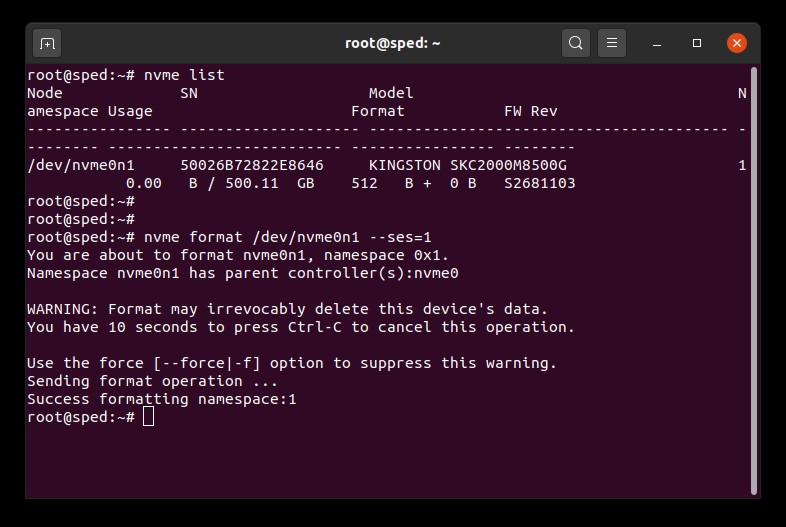
FAQ: KSM-SE-LIX
Was this helpful?
SSD firmware is the integrated software within an SSD that manages its operations, including communication with the host system, data storage and retrieval, wear leveling, and error correction.
If your SSD requires new firmware, you will receive a notification when running Kingston’s SSD Manager software.
FAQ: KSD-012010-001-11
Was this helpful?
Trim and garbage collection are technologies that modern SSDs incorporate to improve both their performance and endurance. When your SSD is in its fresh out of box condition all of the NAND blocks are empty so the SSD can write new data to the empty blocks in a single operation. Over time most of the empty blocks will become used blocks that contain user data. In order to write new data to used blocks the SSD is forced to perform a read-modify-write cycle. The read-modify-write cycle hurts the SSDs overall performance because it now must do three operations instead of a single operation. The read-modify-write cycle also causes write amplification which hurts the SSDs overall endurance.
Trim and garbage collection can work together to improve SSD performance and endurance by freeing up used blocks. Garbage collection is a function built into the SSD controller that consolidates data stored in used blocks in order to free up more empty blocks. This process happens in the background and is completely handled by the SSD itself. However the SSD may not know which blocks contain user data and which blocks contain stale data that the user has already deleted. This is where the trim function comes in. Trim allows the operating system to inform the SSD that data has been deleted so that the SSD can free up those previously used blocks. For trim to work both the operating system and the SSD must support it. Currently most modern operating systems and SSDs support trim however most RAID configurations do not support it.
Kingston SSDs take advantage of both garbage collection and trim technologies in order to maintain the highest possible performance and endurance over their lifetime.
FAQ: KSD-011411-GEN-13
Was this helpful?
Please see our guide regarding the the differences between solid state drives and hard disk drives.
FAQ: KSD-012010-001-29
Was this helpful?
Please see our guide regarding differences between these NVMe and SATA SSDs.
FAQ: KSD-012010-001-19
Was this helpful?
1. First, we recommend you backup your data.
2. Then use a secondary system to complete a REVERT using the PSID on the drive label. Note: Performing a REVERT will securely erase all data on the drive.
3. Disable IEEE 1667 support
4. The firmware update will become available upon refresh or restart of KSM
FAQ: KSM-001125-001-01
Was this helpful?
Kingston recommends updating your SSD to the latest available firmware, where possible. You can check to see if your drive has an available update by using Kingston’s SSD Manager software.
FAQ: KSD-012010-001-25
Was this helpful?
FAQ: KSM-001125-001-00
Was this helpful?
When cloning to a new drive larger than the source drive, the software may not properly scale partition size. When this occurs, you might end up with unused space. To avoid this please follow our cloning instructions.
FAQ: KSD-012010-001-04
Was this helpful?
Caution! The workarounds below will break RST RAID arrays and could lead to data loss. If your system has RST RAID arrays you should consider an alternate solution.
Workaround 1: Disable RST Control in BIO
This workaround requires BIOS options to enable or disable RST Control and is not available on all systems
Note: Please backup all important data before you proceed!
- Restart and enter the system BIOS
- Locate the RST Configuration settings in BIOS
- Change "RST Controlled" to "Not RST Controlled"
- Save and exit BIOS
- Open KSM and update the drive firmware
Once these steps are completed you may optionally switch back to "RST Controlled" in BIOS.
Workaround 2: Switch from RAID to AHCI in BIOS
This workaround is to change your system storage mode from RAID to AHCI and should work on all systems.
Note: Please backup all important data before you proceed!
- Open msconfig
- Select the Boot tab
- Check Safe boot (minimal)
- Click OK and Restart
- When the system restarts go into the system BIOS
- Change the storage mode from RAID to AHCI
- Save and exit BIOS
- Wait for Windows to boot into safe mode
- Open msconfig
- Select the Boot tab
- Uncheck Safe boot
- Click OK and Restart
- Wait for Windows to boot normally
- Open KSM and update the drive firmware
Once these steps are completed you may optionally switch the storage mode back to RAID in BIOS.
FAQ: KSD-001525-001-01
Was this helpful?
FAQ: KSM-001125-002-01
Was this helpful?
SSD firmware is the integrated software within an SSD that manages its operations, including communication with the host system, data storage and retrieval, wear leveling, and error correction.
If your SSD requires new firmware, you will receive a notification when running Kingston’s SSD Manager software.
FAQ: KSD-012010-001-11
Was this helpful?
FAQ: KSD-012010-001-12
Was this helpful?
FAQ: KSD-012010-001-13
Was this helpful?
While it may be possible to update your target drive’s firmware via USB storage enclosure, Kingston recommends against this. Proper update procedure involves having your target SSD directly connected to the system ports (SATA or NVMe, where applicable).
FAQ: KSD-012010-001-14
Was this helpful?
When cloning to a new drive larger than the source drive, the software may not properly scale partition size. When this occurs, you might end up with unused space. To avoid this please follow our cloning instructions.
FAQ: KSD-012010-001-04
Was this helpful?
If the drive is present in the BIOS, you may need to initialize the disk within the operating system. Follow the steps below to initialize.
For Windows:
Step 1: Confirm the drive is properly attached, and power on the system, then boot into Windows OS.
Step 2: Press Windows + X and choose Disk Management.
Step 3: If the SSD is new and not initialized, a popup will appear saying "Initialize Disk."
Step 4: Choose between: MBR (Master Boot Record): Suitable for drives under 2TB and older systems. GPT (GUID Partition Table): Recommended for modern systems and drives larger than 2TB.
Step 5: Click OK to initialize the disk.
Step 6: Once initialized, you'll see the SSD as "Unallocated." Right-click on it and select New Simple Volume.
Step 7: Follow the on-screen prompts (keeping all defaults is Okay) to format and assign a drive letter to the SSD.
For macOS:
Step 1: Confirm the drive is properly attached, and power on the system, then boot into Mac OS.
Step 2: Open Disk Utility (you can find it using Spotlight with Cmd + Space and then typing "Disk Utility").
Step 3: In the left pane, select your SSD.
Step 4: Click on Erase.
Step 5: Provide a name for the drive, and under Format, choose: APFS for newer Macs and SSDs. Mac OS Extended (Journaled) for older systems or HDDs.
Step 6: Click Erase. Once the process completes, the SSD will be ready for use.
For Linux:
Step 1: Confirm the drive is properly attached, and power on the system, then boot into Linux OS.
Step 2: Open a terminal.
Step 3: Enter sudo fdisk -l to list all connected drives. Identify your SSD by its size and note the device name, e.g., /dev/sdb.
Step 4: Initialize the SSD using fdisk or parted. Here's a basic guide using fdisk: Enter sudo fdisk /dev/sdb (replace /dev/sdb with your SSD's device name). Press g to create a new GPT partition table. Press n to create a new partition. Follow the prompts to specify the size and type. Press w to write the changes.
Step 5: Format the new partition on the SSD (e.g., /dev/sdb1). You can format it with the filesystem of your choice: For ext4: sudo mkfs.ext4, For ext3: sudo mkfs.ext3 /dev/sdb1 /dev/sdb1, For FAT32: sudo mkfs.vfat /dev/sdb1
Step 6: Mount the SSD: Create a mount point: sudo mkdir /mnt/myssd, Mount the SSD: sudo mount /dev/sdb1 /mnt/myssd, Remember to replace /dev/sdb1 with your SSD's partition name.
FAQ: KSD-012010-001-15
Was this helpful?
There are a variety of external enclosures available on the market. While Kingston aims to be compatible with all system types, occasionally, there may be an incompatibility.
If you’re having trouble with your non-Kingston SSD enclosure, please contact Kingston Technical Support for troubleshooting assistance.
FAQ: KSD-012010-001-18
Was this helpful?
When cloning to a new drive larger than the source drive, the software may not properly scale partition size. When this occurs, you might end up with unused space. To avoid this please follow our cloning instructions.
FAQ: KSD-012010-001-04
Was this helpful?
SSD firmware is the integrated software within an SSD that manages its operations, including communication with the host system, data storage and retrieval, wear leveling, and error correction.
If your SSD requires new firmware, you will receive a notification when running Kingston’s SSD Manager software.
FAQ: KSD-012010-001-11
Was this helpful?
FAQ: KSD-012010-001-13
Was this helpful?
FAQ: KSD-012010-001-12
Was this helpful?
If this is not possible, or if you previously cloned your old data to your new drive, confirm that the new drive appears as a boot device in the system BIOS, then select it for booting.
FAQ: KSD-012010-001-03
Was this helpful?
There are a variety of external enclosures available on the market. While Kingston aims to be compatible with all system types, occasionally, there may be an incompatibility.
If you’re having trouble with your non-Kingston SSD enclosure, please contact Kingston Technical Support for troubleshooting assistance.
FAQ: KSD-012010-001-18
Was this helpful?
If the drive is present in the BIOS, you may need to initialize the disk within the operating system. Follow the steps below to initialize.
For Windows:
Step 1: Confirm the drive is properly attached, and power on the system, then boot into Windows OS.
Step 2: Press Windows + X and choose Disk Management.
Step 3: If the SSD is new and not initialized, a popup will appear saying "Initialize Disk."
Step 4: Choose between: MBR (Master Boot Record): Suitable for drives under 2TB and older systems. GPT (GUID Partition Table): Recommended for modern systems and drives larger than 2TB.
Step 5: Click OK to initialize the disk.
Step 6: Once initialized, you'll see the SSD as "Unallocated." Right-click on it and select New Simple Volume.
Step 7: Follow the on-screen prompts (keeping all defaults is Okay) to format and assign a drive letter to the SSD.
For macOS:
Step 1: Confirm the drive is properly attached, and power on the system, then boot into Mac OS.
Step 2: Open Disk Utility (you can find it using Spotlight with Cmd + Space and then typing "Disk Utility").
Step 3: In the left pane, select your SSD.
Step 4: Click on Erase.
Step 5: Provide a name for the drive, and under Format, choose: APFS for newer Macs and SSDs. Mac OS Extended (Journaled) for older systems or HDDs.
Step 6: Click Erase. Once the process completes, the SSD will be ready for use.
For Linux:
Step 1: Confirm the drive is properly attached, and power on the system, then boot into Linux OS.
Step 2: Open a terminal.
Step 3: Enter sudo fdisk -l to list all connected drives. Identify your SSD by its size and note the device name, e.g., /dev/sdb.
Step 4: Initialize the SSD using fdisk or parted. Here's a basic guide using fdisk: Enter sudo fdisk /dev/sdb (replace /dev/sdb with your SSD's device name). Press g to create a new GPT partition table. Press n to create a new partition. Follow the prompts to specify the size and type. Press w to write the changes.
Step 5: Format the new partition on the SSD (e.g., /dev/sdb1). You can format it with the filesystem of your choice: For ext4: sudo mkfs.ext4, For ext3: sudo mkfs.ext3 /dev/sdb1 /dev/sdb1, For FAT32: sudo mkfs.vfat /dev/sdb1
Step 6: Mount the SSD: Create a mount point: sudo mkdir /mnt/myssd, Mount the SSD: sudo mount /dev/sdb1 /mnt/myssd, Remember to replace /dev/sdb1 with your SSD's partition name.
FAQ: KSD-012010-001-15
Was this helpful?
While it may be possible to update your target drive’s firmware via USB storage enclosure, Kingston recommends against this. Proper update procedure involves having your target SSD directly connected to the system ports (SATA or NVMe, where applicable).
FAQ: KSD-012010-001-14
Was this helpful?
